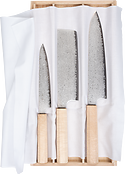Niwaki Hamon Damascus Knife Set
Gyuto, Nakiri & Petty
Perhaps the last three knives you will ever buy. These incredible knives, forged in Sanjo, up in Niigata in the North of Japan (famous, amongst other things, for heavy winter snow and fantastically fresh fish) incorporate hand forged VG-10 stainless steel… read the full description.
Delivering to US (Paying in USD)
⚠️ Sorry, Niwaki Hamon Damascus Knife Set is not available. Please Contact Us for advice on alternatives.
Please note: By law, we are not permitted to sell a knife or blade to any person under the age of 18. By placing an order for one of these items you are declaring that you are 18 years of age or over. These items must be used responsibly and appropriately.
Product description
Perhaps the last three knives you will ever buy. These incredible knives, forged in Sanjo, up in Niigata in the North of Japan (famous, amongst other things, for heavy winter snow and fantastically fresh fish) incorporate hand forged VG-10 stainless steel hagane blades, laminated to a beautiful damascus jigane, creating a highly practical and deeply alluring finish.
The damascus blade is balanced by the grain of the octagonal camphor wood handles (from the enormous Cinnamomum camphora trees that are native to Japan and one often sees growing outside Shinto shrines) and the whole set of three knives sits in a Paulownia kiribako box, wrapped within a white cotton raw-edge tenugui (suggesting, perhaps, the purity and widsom of the Shinto gods).
This range of exquisite knives has been crafted by third generation bladesmiths in Sanjo, the home of blacksmithing in Japan’s Niigata Prefecture. Since the establishment of the forge in 1927, knowledge and technical know-how have been passed down through successive generations, with tradition and innovation working hand in hand. The patent for three-layer stainless steel knives in the late 1950s was starting point for this range, which showcases the best characteristics of stainless steel.
Best usage
Use the short Petty for peeling and paring, the square ended Nakiri for vegetables, and the mighty Gyuto for pretty much everything.







